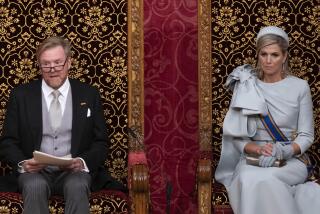Man of Surprises Strikes Again : De Klerk’s methodical drive to end apartheid
- Share via
In his yearly address at the opening of Parliament next week, South African President Frederik W. de Klerk is expected to push for the repeal of laws that mandate segregated housing and land. It is yet another step in his determined and methodical drive to end more than 40 years of apartheid.
Under the current and brutally unfair legal system, the majority of 29 million black men, women and children are forced to live in poverty in the slums of urban townships or in desolate rural “homelands” with no legal freedom of movement. The 5 million people of the white minority largely enjoy separate and unequal lives of privilege and power wherever they choose to live. Many live in gleaming cities, wealthy suburbs or on huge, industrial farms.
Virtually every square inch of land is designated by racial classification under the Group Areas Act. More than 85% of the land is reserved solely for whites by the Lands Act. De Klerk wants Parliament to repeal these laws--finally.
In his opening address last February, De Klerk stunned the world by unbanning the African National Congress, a revolutionary and sometimes violent anti-apartheid movement. In that same month, De Klerk freed the ANC’s Nelson Mandela, who had spent 27 years in prison because of his opposition to apartheid.
In the year since those breakthroughs, De Klerk has lifted the state of emergency, promised to free political prisoners (at least as defined by the government) and pledged to eventually allow the return of thousands of black exiles.
As he takes the next significant steps, De Klerk must somehow persuade his followers as well as conservative and right-wing whites to give up a lot in the interest of a united and racial democracy.
And in the interest of timely progress, he must rein in the police and security forces. They have been accused, and rightly so in many cases, of siding with the Zulus and against followers of the ANC in political and ethnic fighting that has claimed more than 1,000 lives in the past year.
Black groups, including the ANC, have complained about the slow pace of progress and reforms that have not improved one whit the daily lives of most black South Africans. But few have abandoned the commitment to negotiations for a new constitution that would mandate racial equality.
After months of stalemate, the ANC ended its untenable demand for an elected constituent assembly to handle formal negotiations. In a major compromise, the nation’s most prominent black organization called for a multi-party political conference which would include De Klerk’s National Party, the pro-apartheid Conservative Party and other major black parties. Unfortunately, Mangosuthu Gatsha Buthelezi, the Zulu chief who leads the Zulu-based Inkatha Freedom Party, has not committed to what he blindly sees as an ANC grab for exclusive power. The militant Pan Africanist Congress also has refused to participate.
The challenges are formidable. De Klerk and the other major players, however, continue to push against tough odds toward progress in South Africa.
More to Read
Sign up for Essential California
The most important California stories and recommendations in your inbox every morning.
You may occasionally receive promotional content from the Los Angeles Times.













